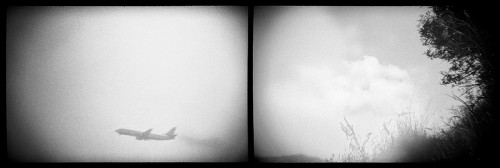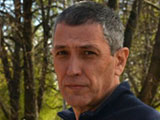Departure
by Israel Centeno / translated by Kelly Harrison / January 16, 2014 / No comments
Politics and Home: The power of leaving, the pain of leaving.

Photo: Kaometet via Flickr.
By the time I left Venezuela via Simón Bolívar airport in 2010, I felt as though I was only making my situation official. I’m not going to go into detail about the personal threats I received in the years before I left, nor discuss the loss, the aggression, the fear, and the experience of being branded a traitor by those I loved. I will simply say that, despite all sense of belonging and nationality, nobody can make you stay in a place that is dangerous and unfavorable to you. Instead, to explain myself, I take the phrase used to describe Simón Bolívar, and turn it on its head to remove his influences: I’m tired of being the ‘man of difficulties’ and, furthermore, I don’t want to be that man, considering that sometimes reality isn’t changed, but broken, and that you can’t find the place you were born other than in another city.

- From his lonely watch post Albert Camus asked who among us has not experienced exile yet still managed to preserve a spark of fire in their soul. “We’re all alone,” Natalia Sedova cried in exile on hearing of her husband Leon Trotsky’s affair with Frida Kahlo. In his novel Night Watch, Stephen Koch follows the incestuous love affair of David and Harriet, wealthy siblings watching the world from their solitary exile. Koch’s writing, Camus’s theories, and Trotsky’s affair all come back to exile and lead me to reflect on the human condition. From my own vantage point, my Night Watch, I will reflect on my questions of exile, writing, and the human condition.

- Israel Centeno was born in 1958 in Caracas, Venezuela, and currently lives in Pittsburgh as a Writer-in-Residence with City of Asylum/Pittsburgh. He writes both novels and short stories, and also works as an editor and professor of literature. He has published nine books in Venezuela and three in Spain.
San Agustín del Sur, La Pastora, San Martín, La Castellana, Catia, and La California are now in every part of the world for me.
I began to stop being in my country after the riots of February 27, 1989, which exploded from a combination of frustration of the middle classes, disillusionment of the old, bitterness of dignitaries from the post-Gomecist era awaiting a return to the prosperity of the 1970s, and a nostalgia for military order that was ever-present in conversations and phone-booth graffiti which demanded that we “stage a coup already” by putting into practice the cherished popular uprising that would end “the bourgeois order” by means of a civil-military revolution in which the tricks of the far left and a developmentalist right, linked to the modernizing projects of the Pérez Jiménez dictatorship, would meet. Though, of course, these plans were not in line with those held by some of the guerrilla commanders.
When did I leave Venezuela? I’d left long before the morning I took a flight going anywhere in the United States, without having anything sorted and with just the desire to move, to find new scenery. Ever since the early hours of February 4, 1992, I had been damaged by a wicked military homeland that hid behind the scenes for a short period of time, playing at institutional modernity. The military came up so many times in tricky conversations in bars, or in the conspiratorial circles of prominent academics, or in the old wives’ tales of entrepreneurs who dreamed of changing everything to keep things the same. Pandora’s box was opened and the unmistakable demons emerged; the barracks responded to the coquetry of the elite through the voice of a lieutenant colonel, orating: “I have come to save you, I have come to restore order and to promise you a victorious march to heaven or paradise. We have not achieved our objectives…for now.”
I have been losing my country little by little ever since. From that moment on, until I had to leave officially, I adapted to this bitterly unfavorable and dangerous situation in order to survive.
In terms of perspective and distance, although I left, I have not gone. I refuse to renounce, now more than ever, my political rights, carefully won with my departure.




